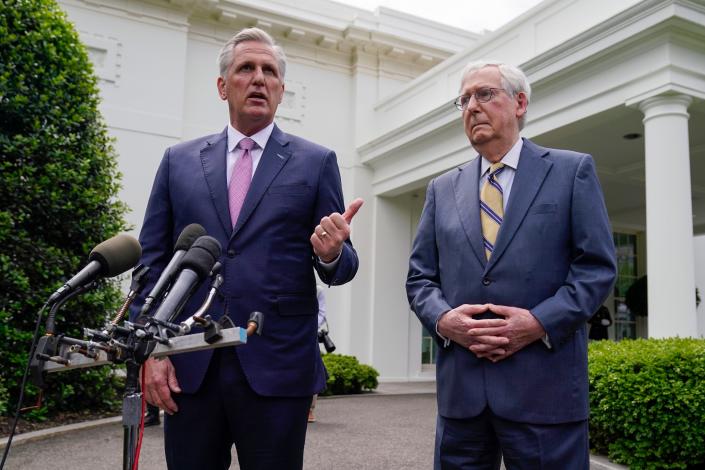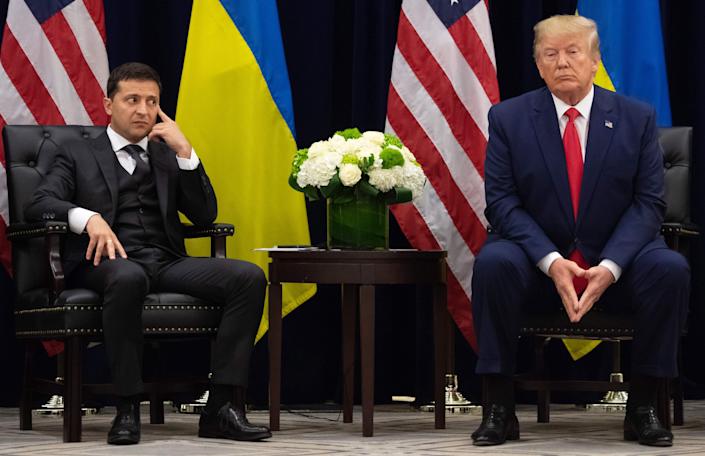When Donald Trump occasionally read a speech directly from a teleprompter, a speech filled with sentences and sentiments that sounded nothing like him, some in the pundit corps would declare that “this is the moment Donald Trump became president.” The moment always passed, and the line quickly became a running joke.
Let’s not make the same mistake with the Republican Party and Ukraine.
It is, of course, a good thing that Democrats, Republicans and independents are largely united in condemning Russia’s brutal, unprovoked war on Ukraine and in their support for imposing economic sanctions against Russia and sending military aid to Ukraine. But let’s get real: Republican politicians are taking no risks. This is, by huge margins, what Americans want them to do. They can get credit for siding with good over evil and at the same time blame setbacks, missteps, tragedies and high gas prices on President Joe Biden.
It’s a no-brainer. This is not the moment Republicans once again became a party of patriots guided by America’s highest ideals.
Falling short of redemption
Congressional Republicans first had a chance to do that two years ago, when Ukraine badly needed help in its long-running struggle against Russian aggression. House Democrats and then-Republican Rep. Justin Amash of Michigan impeached Trump for pressuring Ukrainian President Volodymyr Zelenskyy to investigate political rival Biden while illegally withholding military aid. He also denied Zelenskyy a White House meeting that would have signaled strength to Russia, and floated absurd conspiracy theories about Ukrainians messing in the 2016 U.S. election.


But instead of convicting and removing Trump in a Senate trial, every Senate Republican except Mitt Romney let him off. Senate Minority Leader Mitch McConnell called the impeachment “a thoroughly political exercise.”
Columnist Jill Lawrence: Will voters support Biden when Russia oil ban hits gas prices and the GOP hits the airwaves?
Republicans had another chance to redeem themselves after Trump’s supporters stormed the Capitol in an attack that left five dead and scores of others injured, traumatized and suicidal. Their goal was to stop Vice President Mike Pence and Congress from finalizing Biden’s win in the 2020 election and keep Trump in office. It was rooted in Trump’s “Big Lie” that massive fraud invalidated the 2020 election.
The claim was utterly false, as dozens of expensive and pointless lawsuits, recounts, reviews and investigations showed, but that didn’t stop the attempted coup on Jan. 6, 2021. The House once again impeached Trump, this time for “incitement of insurrection,” including his false claims of fraud and victory and his attempt to get the Georgia secretary of state to “find” votes for him.
Columnist Connie Schultz: Why aren’t all of us having nightmares about the next Jan. 6? Next time may succeed.
Chris Cuomo is burning down CNN.: And he’s taking Don Lemon with him.
Seven Senate Republicans voted against him last year, but it wasn’t enough to reach the two-thirds majority needed to convict and remove him.
Findings in the sprawling House probe of the Jan. 6 attack and the lies that led up to it, from the White House on down, will be aired at public hearings in coming weeks and months. Don’t expect Republicans to take them seriously. Many are more concerned about democracy in Ukraine than in America.
Some haven’t even come that far. The outliers include eight House members who opposed suspending trade relations with Russia, North Carolina Rep. Madison Cawthorn calling the heroic Zelenskyy a “thug,” Fox News host Tucker Carlson (whose pro-Russia rhetoric is turning up on Russian TV) and to some extent Trump himself (he has called Putin a savvy genius).
Columnist Jill Lawrence: Is this the beginning of the end for Trumpism or the Republican Party?
McConnell and House Minority Leader Kevin McCarthy have made clear that they disagree with Trump’s assessment of Putin and that the party stands with Zelenskyy. But Trump continues to shape the GOP.


His allies in the states are trying to win control of elections. They’re passing and introducing dozens of restrictive voting bills, spreading the myth of widespread vote fraud, and adding law enforcement units to police this “problem” that barely exists.
Beyond that, the party is still infected by Trump’s affinity for white nationalists. Jan. 6, 2021, was the first time a Confederate battle flag had ever been carried inside the U.S. Capitol. Last month, Reps. Marjorie Taylor Greene of Georgia and Paul Gosar of Arizona appeared at a white nationalist conference hosted by a white supremacist. GOP leaders said it was wrong, but there have been no consequences.
Columnist Rex Huppke: Marjorie Taylor Greene at a white nationalist conference? Probably Joe Biden’s fault.


Then there’s Trump’s approach to endorsements. His last round resulted in two Georgia Republicans losing their Senate runoff elections in January 2021 – handing Biden a hair’s breadth Democratic majority. But that hasn’t stopped Trump from meddling again. He recruited one of the losers, former Sen. David Perdue, to challenge Gov. Brian Kemp in a Republican primary this year. Why? Because Biden won Georgia in 2020, and Kemp stood by that result.
Loyalty tests and wrong choices
Trump continues to apply his unique criteria to make his picks – Are they loyal to him? Can they win a primary? – while ignoring what any normal political handicapper would see as major general-election flaws.
Thus Trump endorsed former football star Herschel Walker in a Georgia Senate primary, despite reports that Walker had threatened several women. Trump endorsed Sean Parnell in a Pennsylvania Senate primary, then Parnell dropped out after losing a custody battle to an ex-wife who had accused him of domestic abuse. He endorsed Rep. Mo Brooks in the Alabama Senate primary, but now is considering un-endorsing him because Brooks doesn’t look like a winner and may be insufficiently committed to overturning the 2020 election.
The heart of it is this: When there’s a clash of values, when the stakes are no less than the character and future of their own nation, Republicans can’t be trusted to make the right choice.
On the Ukraine-Russia conflict, the starkest moral choice in decades, most of them are finally siding with democracy, humanity and their own better angels. But standing with Ukraine and against Putin is far from the most the Republican Party can do to correct course. It’s the least.
Jill Lawrence is a columnist for USA TODAY and author of “The Art of the Political Deal: How Congress Beat the Odds and Broke Through Gridlock.” Follow her on Twitter: @JillDLawrence
You can read diverse opinions from our Board of Contributors and other writers on the Opinion front page, on Twitter @usatodayopinion and in our daily Opinion newsletter. To respond to a column, submit a comment to letters@usatoday.com.
This article originally appeared on USA TODAY: Ukraine isn’t enough: Denouncing Russia won’t fix the Republican Party




